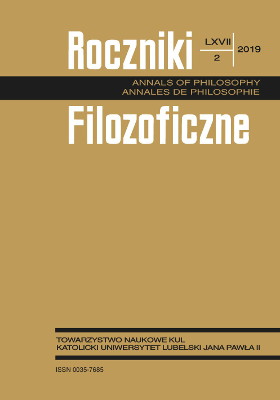God as primum cognitum – Discussions and Controversies (Duns Scotus, Henry of Ghent, Thomas Aquinas, Bonaventure and Nicholas of Cusa)
Abstract
In this article, I present the conception of the first object of human intellect (primum cognitum) in the thought of the leading representatives of 13th century Scholasticism. The first object of a cognitive faculty is the essence that determines the proper domain of that faculty; thus the first object of human intellect is what defines the possible extension of human epistemic possibilities. The conception of the first object of human intellect presupposes and implies definite solution of important epistemological, metaphysical, and anthropological questions. While one current of scholastic opinion, represented by St. Bonaventure and Henry of Ghent favored God as the first object of human intellect, more empirically minded Aquinas upheld the Aristotelian position that the proper object of human intellectual cognition is the essence of material reality; Duns Scotus evolved an elaborate position that tried to steer the middle course between the solutions of his predecessors and overcome the one-sidedness of their insights. Finally, I proceed to vindicate my opinion, that the epistemology of the 15th century thinker Nicholas of Cusa remained under significant influence of the scholastic debates and solutions.
References
Albertson, David. Mathematical Theologies. Nicholas of Cusa and the Legacy of Thierry of Chartres. Oxford: Oxford University Press, 2014.
Counet, Jean-Michel. Mathématique et dialectiques chez Nicolas de Cues. Paris: Vrin, 2000.
Cullen, Christopher M. „Bonaventure’s Philosophical Method”. W: A Companion to Bonaventure, red. Jay Hammond, Wayne Hellmann i Jared Goff, 121–163. Leiden: Brill, 2013.
Devriendt, Jean. „Bonaventure”. W: Encyclopédie des mystiques rhénans d’Eckhart à Nicolas de Cues et leur réception, red. Marie-Anne Vannier, 209–213. Paris: Cerf, 2011.
Dillard, Peter S. A Way into Scholasticism. A Companion to St. Bonaventure’s “The Soul’s Journey into God”. Eugene, Oregon: Cascade Books, 2011.
Führer, Marcus. Echos of Aquinas in Cusanus’s Vision of Man. Lanham, Boulder, New York, Toronto, Plymouth: Lexington Books, 2014, [e-book].
Honnefelder, Ludger. Ens inquantum ens. Der Begriff des Seienden als solchen als Gegenstand der Metaphysik nach der Lehre des Johannes Duns Scottus. (Beiträge zur Geschichte der Philosophie und Theologie des Mittelalters, Band 16). Münster: Aschendorff, 1979
Hödl, Ludwig. „The Theologian Henry of Ghent”. W: A Companion to Henry of Ghent, red. Gordon A. Wilson, 103–134. Leiden: Brill, 2010.
Kijewska, Agnieszka. „Idiota de mente: Cusanus’ Position in the Debate between Aristotelianism and Platonism”. W: Nicholas of Cusa on the Self and Self-Consciousness, red. Walter Andreas Euler, Ylva Gustafsson i Iris Wikström, 67–88. Åbo: Åbo Akademi University Press 2010.
Kijewska, Agnieszka. „Nicolas de Cues – le philosophe de la Renaissance?”. W: Construction d’un imaginaire collectif européen. De la Renaissance aux Lumières: Allemagne, France, Pologne. Unité et diversité, red. Leszek Kańczugowski, 73–91. Lublin: Wydawnictwo KUL, 2014.
Kijewska, Agnieszka. „Wstęp”. W: Mikołaj z Kuzy. Laik o umyśle. Przełożyła Agnieszka Kijewska, 5–59. Kęty: Wydawnictwo Marek Derewiecki, 2008.
King, Peter. „Scotus on Metaphysics”. W: The Cambridge Companion to Duns Scotus, red. Thomas Williams, 13–68. Cambridge: Cambridge University Press, 2003.
Kurdziałek, Marian. „Dlaczego św. Tomasz z Akwinu komentował De Trinitate i De hebdomadibus Boecjusza?”. W: Marian Kurdziałek. Średniowiecze w poszukiwaniu równowagi między arystotelizmem a platonizmem, 169–182. Lublin: TN KUL, 1996.
Laarmann, Matthias, “God as primum cognitum. Some Remarks on the Theory of Initial Knowledge of Esse and God according to St. Thomas Aquinas and Henry of Ghent”. W: Henry of Ghent: Proceedings of the International Colloquium, red. W. Vanhamel, 171–192. Leuven: Leuven University Press, 1996.
Lichacz, Piotr, Mikołaj Olszewski i Mateusz Przanowski. „Wstęp”. W: Święty Tomasz z Akwinu. O poznaniu Boga. Przełożyli Piotr Lichacz, Mateusz Przanowski i Mikołaj Olszewski. Źródła chrześcijańskie, 5–51. Kraków: Wydawnictwo M, 2005.
Miller, Clyde Lee. Reading Cusanus. Metaphor and Dialectic in a Conjectural Universe. Washington: Catholic University of America Press, 2003.
Müller, Irmgard. „Nikolaus von Kues und die Medizin”. W: Nikolaus von Kues 1401–2001. Akten des Symposiums in Bernkastel-Kues vom 23. Bis 26. Mai 2001, red. Klaus Kremer i Klaus Reinhardt, 333–350. Trier: Paulinus, 2003.
Olszewski, Mikołaj. O praktycznej bądź teoretycznej naturze teologii. Kraków: Universitas, 2002.
Olszewski, Mikołaj. „Wprowadzenie”. W: Święty Bonawentura. O wiedzy Chrystusa. O tajemnicy Trójcy. Przełożył Mikołaj Olszewski, 7–54. Kęty: Wydawnictwo Marek Derewiecki, 2006.
Pasnau, Robert. „Cognition”. W: The Cambridge Companion to Duns Scotus, red. Thomas Williams, 285–311. Cambridge: Cambridge University Press, 2003.
Pickavé, Martin. „Henry of Ghent on Metaphysics”. W: A Companion to Henry of Ghent, red. Gordon A. Wilson, 153–179. Leiden: Brill, 2010.
Raczyńska, Barbara. „Filozoficzna teoria człowieka w głównych traktatach salernitańskich”. Acta Mediaevalia XI (1997): 2–138.
Steenberghen, Van Fernand. Filozofia w wieku XIII. Przełożył Edward Iwo Zieliński. Lublin: Wydawnictwo KUL, 2005.
Swieżawski, Stefan. Dzieje filozofii europejskiej XV wieku. T. 1: Poznanie. Warszawa: Akademia Teologii Katolickiej, 1974.
Swieżawski, Stefan. Dzieje filozofii europejskiej XV wieku. T. 3: Byt. Warszawa: Akademia Teologii Katolickiej, 1978.
Zagadnienie historii filozofii. Wyd. 2, red. Mikołaj Olszewski i Jacek Jadacki. Warszawa: Wydawnictwo Naukowe Semper, 2005.
Taylor, Charles. „Philosophy and its history”. W: Philosophy in History: Essays on the historiography of philosophy, red. Richard Rorty, Richard McKay Rorty, Jerome B. Schneewind i Quentin Skinne, 17–30. Cambridge: Cambridge University Press, 1984.
Trepczyński, Marcin. Ścieżki myślenia Alberta Wielkiego i Tomasza z Akwinu. Warszawa: Wydawnictwo Campidoglio, 2013.
Trottmann, Christian. Théologie et noétique au XIIIe siècle. A la recherche d’un statut. (Études de philosophie médiévale, LXXVIII). Paris: Vrin, 1999.
Wieczorek, Bartosz. „Mistyka i dialog międzyreligijny w filozofii Mikołaja z Kuzy”. Studia Warmińskie 41–42 (2004–2005): 153–180.
Wood, Rega. „The Aristotelian science of metaphysics”. W: The Cambridge History of Medieval Philosophy, red. Robert Pasnau i Christina Van Dyke, 609–621. Cambridge: Cambridge University Press, 2010.
Zieliński, Edward Iwo. Jednoznaczność transcendentalna w metafizyce Jana Dunsa Szkota. Lublin: Redakcja Wydawnictw KUL, 1988.
Zieliński, Edward Iwo. „Jana Dunsa Szkota rozumienie metafizyki i jej przedmiotu”. W: Metafizyka w filozofii, red. Andrzej Maryniarczyk i Katarzyna Stępień. (Zadania współczesnej metafizyki, 6), 129–143. Lublin: Polskie Towarzystwo Tomasza z Akwinu, 2004.
Copyright (c) 2019 Roczniki Filozoficzne

This work is licensed under a Creative Commons Attribution-NonCommercial-NoDerivatives 4.0 International License.





